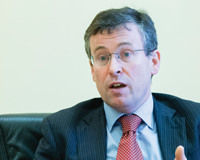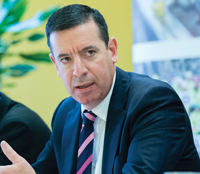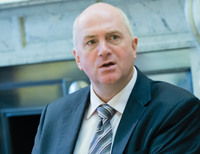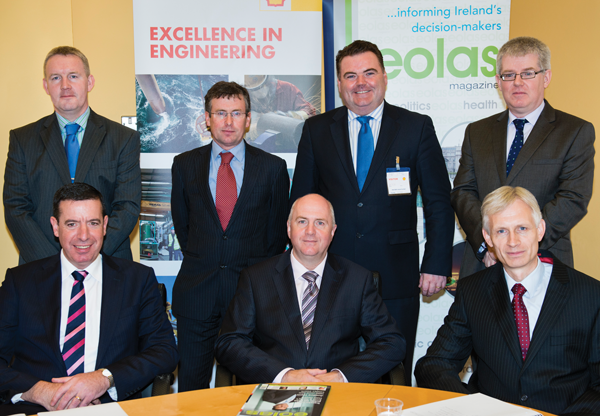Shell round table: Natural gas: Transforming Ireland’s energy future
Ireland’s gas market is undergoing a period of change and is poised to remain vital to the country’s energy mix. Shell E&P Ireland brought together key stakeholders across the energy sector to discuss the outlook for natural gas.
Are we on the cusp of the golden age of natural gas?
John Mullins
There’s quite a serious policy debate ahead of the US presidential election, where essentially there is a bit of difference between the Democratic and the Republican perspectives over where energy policy should go: renewables; and coal versus gas. Gas prices in the US have completely separated from gas prices elsewhere. $2 per liquefied natural gas MMBtu is actually not good for the hydrocarbon companies that are producing gas in various parts of the US.
From a global perspective, that is creating a coal displacement issue, which, as a result, is driving the price of coal down. As a result we are now seeing in Europe quite an amount of coal-fired generation: 3 billion cubic feet per day less in gas consumption. We’re no different; in Ireland we’re seeing Moneypoint power station running much more today than it did last year or the year before. The coal price is significantly down. There would have to be a 50 per cent coal price move upwards so that combined cycle gas turbines would be on a par with the technology. The impact of shale gas in the US is having a material impact indirectly and directly on the European and Irish gas markets.
 Michael Crothers
Michael Crothers
Shell sees it in the context of two key factors: the growth in energy demand driven by a global population that’s forecast to rise to 9 billion people over the next 30 years, with an emerging middle-class in China and India that is driving demand as their standards of living improve, and also the need to do something about climate change.
International Energy Agency forecasts say that by 2035, we’re still going to be two-thirds to 75 per cent reliant on hydrocarbons in our energy mix despite the pace of renewables, which we all support.
We see gas, because it’s significantly cleaner than coal and oil, as a bridge between current and future requirements. There is a lot of opportunity in the technology space with respect to gas, not only for heat and power but also for transportation fuels. I think those are areas where there’s also a lot of opportunity for Ireland, which is still heavily reliant on hydrocarbons with over 60 per cent of power coming from gas, but wanting to progress towards a renewable future. In Shell, we don’t see it as an ‘either/or’; it’s both. We think we need all the diverse sources of energy to provide requirements.
Neil Walker
I endorse the previous comments. The outlook for shale gas in Europe is much more uncertain because there’s a different level of environmental regulation, and it’s unclear whether it will ever bring down European prices. In a way, having high gas prices makes it appear less expensive to support renewables because of the close relationship between gas and electricity prices on the island of Ireland. In Britain, there’s a bit of a dash for gas going on. It’s arguable that the current regime is retreating from its renewables commitments but that is an opportunity for us here in that we could be exporting renewables.
John Reilly
The most interesting aspect from the generators’ perspective is that the correlation in the Irish wholesale electricity market between gas and electricity prices is probably close to one because of the market’s structure. Unlike coal, and oil to a lesser extent, you probably have what amounts to three-dimensional global markets. The gas market is quite fractured. You’re paying $2 per MMBtu for gas in the US, whereas in Western Europe, you’re paying some multiples of that. I think that’s the dynamic that’s going to be interesting going forward: whether or not the shale gas revolution, with LNG and the possibility of the US exporting gas, will bring a greater global convergence of gas prices, because that will have a direct impact on electricity prices in western Europe, and very specifically in Ireland. Because of the marginal pricing approach in the SEM, if you’re generating from materials other than gas, like coal for example, high gas prices significantly boost the attractiveness of alternatives like coal and renewables.
 David McNamara
David McNamara
One of the good news stories is that it’s not just the US that has shale. It’s also in countries like Argentina, China and Poland. There’s plenty of gas around. Gas generation has flexibility. It’s relatively low carbon density. It’s good certainly compared to coal and it’s quick and fast to build in the electricity generation sector.
Our view would be that it’s certainly a bridge towards a much more effective deployment of renewables. It can deliver 24/7 as distinct from the typically intermittent nature of renewables today. That bridge is possibly longer than people are thinking.
Declan Meally
Energy users are conscious of the fact that natural gas is so linked to the electricity market. Large energy users have the ability to look at the pool pricing but it’s becoming so difficult getting into that mix. It’s something that they’re struggling with. The idea of the market change coming down the track is leading to some uncertainty about whether we are really going to be price takers. Gas is always quotable at the end of a gas pipeline coming from Russia etc.
In terms of the opportunities that LNG will provide and having another route in potentially through Shannon, we have to look at security of supply. Security of supply is a major issue and we can help this through hedging and be masters of our own destiny in terms of competition. Gas will definitely supplement and work with renewables. It has happened and we are seeing it even today with 22-23 per cent electricity generation from wind; at weekends it can be up to 50 per cent. The grid can take it, the flexibility is there through the gas opportunities, but if we’re going to get price distortions, they are going to cause security of supply issues.
John Mullins
Being on a long pipeline to Russia is irrelevant to Ireland. Quite clearly, in terms of long-term reserves one would have thought of it as being important in a time when unconventional gas didn’t really have a part to play. The world paradigm in gas has changed significantly. Since I took this job in 2007 I’ve taken a view that we’re on a long pipeline to the Corrib platform and to Kinsale Energy, which is not depleting any time soon.
The security of supply issue is certainly being advantaged by Corrib coming on, and there’s been a big debate about the role of the two interconnecting pipes. In the first instance, a company invested in those pipes to create a market, and others benefited from that market. If we didn’t have those two pipes we wouldn’t have the level of CCGTs and 60 per cent power generation from gas today. It’s very easy to re-write history in the context of where we are today without understanding the risks that were taken to establish the gas market. Therefore, regarding LNG, if you look at the price of gas that we experience today, the last therm of gas is arriving out of Milford Haven or Dragon and that is the last therm that is fundamentally being driven into market.
Michael Crothers
There’s a lot of potential with existing field drilling and new technology that allows us to recover gas that was previously being left behind and those technologies are very much supporting the continued delivery of gas from our North Sea assets.
John Mullins
It is very clear that within the islands of Britain and Ireland energy is a critical feature, whether it is electricity interconnection, gas interconnection or access to natural resources around the North Sea. I would hope that there would be a day when we will have enough gas resources in the inner area that one of the interconnectors could be in reverse flow, back into Britain. That’s not something we should rule out over the next decade.
How do you see the future energy mix for Ireland?
John Reilly
The energy mix in electricity doesn’t change with any great speed. In Ireland at the moment we have a generation overcapacity, principally because of the ongoing installation of wind capacity and the fall in demand due to recession. European and national policy is that we will achieve our renewables targets, which will require the continued build-out of wind, so the overall portfolio for at least the next decade is effectively fixed. In that scenario, gas is a perfect bedfellow for wind, whether you describe it as intermittent or variable. The CCGT fleet we have is in many ways a perfect bedfellow for intermittent and variable wind for power system management. In that context, gas will remain the majority contributor to electricity generation for at least the next decade.
Michael Crothers
Ireland’s energy mix is still hydrocarbon-based: currently 89 per cent of the total. There’s still a role for gas to penetrate further. Look at what’s happened in Mayo: our partnership with Bord Gáis in getting the link line in 12 towns, in Mayo and Galway, now onto gas. Businesses like Baxter and Allergan, healthcare and pharmaceutical companies based in Castlebar and Westport respectively, are finding that they’re saving millions of euro per year now on total costs. There’s a bit more penetration potential to substitute some of the other hydrocarbons for gas.
 John Mullins
John Mullins
The next demand for gas will happen in a part of the country that will benefit from the creamery quota disappearing. Queries coming through regarding industrial demand are, in the main, emanating from the agri-food sector.
Because US policy is going to orientate towards trucks and buses moving towards natural gas because of the availability of cheap gas, there is a fantastic opportunity here in the transport sector, both economically and environmentally, to use the indigenous gas in our transport fleets. We don’t have rail freight in this country and we export our goods using containers on the back of trucks and we are export-orientated. We’re certainly looking at 20 per cent cost reductions at the very least by using gas in transport. In the world of today, with petrol and diesel prices where we’re at, that’s very attractive for truck and bus drivers.
What are the long-term constraints for gas?
John Reilly
One of the challenges around carbon capture storage concerns the flexibility that gas-fired generation currently provides, its ability to ramp and ‘load follow’. Intuitively, I think that if you stick CCS onto gas-fired generation it’s going to considerably reduce its flexibility. That doesn’t mean from a climate perspective that gas won’t play a role if it’s operating effectively as baseload technology, but the climate and renewables policy in general is pushing renewables into the baseload space. So I think that’s an engineering challenge that needs to be overcome in the longer term. If we’re keeping gas in the mix as a bridging fuel, we’re going to have a level of carbon intensity associated with electricity generation for decades to come, it’s not likely to be carbon zero. It’ll still be small in terms of what comes from gas. I would caution about the flexibility piece.
The EU Emissions Trading System suffers from a lack of coherence in relation to other policy measures. The price of carbon in the ETS today is dictated by a number of factors. Firstly, the initial cap imposed did not envisage the sort of recession that’s happened across Europe. Secondly, it didn’t factor in the drive to renewables and the level of displacement from technologies with lower carbon emissions intensity. Thirdly, and it hasn’t impacted yet to any large degree, is the energy efficiency drive’s impact on reducing emissions.
The lack of EU policy coherence is the fundamental issue for the carbon price today, and the current price will not drive decarbonisation. The ETS’ structure needs to be addressed. The Commission needs to fix it in terms of the global carbon market and global drive to decarbonisation. That’s challenging given where international climate change talks sit.
 Declan Meally
Declan Meally
Building on that, I don’t think carbon is generally seen as a commodity relating to everybody. It is for some large industries in terms of being in the ETS. For others, it’s a traded commodity at some levels but not at others. I think that’s where the lack of coherence is: whether it’s a market price or not. It’s starting to build and we’re starting to see corporates taking responsibility for their carbon footprints and then realising the impact of that. Coherence will come as carbon becomes a common currency, but it’s not common yet and that is adding a little bit to the confusion around the carbon market.
What are the barriers to the development of Ireland’s natural gas resources?
Michael Crothers
Corrib has taught us, and it’s something we knew but obviously didn’t apply well at the outset, the need to work very closely with communities at the earliest conceptual stages of a project: to make sure that they understand the benefits for them, and that their needs are taken into account. That’s vital.
Another thing that we have to keep in mind is the benefits that come from these developments. These projects are very capital-intensive. Corrib represents a €6 billion net GDP improvement for Ireland’s economy. Presently we have 900 full-time jobs; we peaked at about 1,400 jobs. That’s really important and there’s a massive spin-off benefit, not only in terms of jobs and work but also the skills development. Think about the technical businesses that we’re in: the demand for engineering skills, advanced skills in terms of tradespeople. Those build capacity for Ireland that we can leverage for the future.
We need to do something to make the planning process simpler and more effective. We need to make sure that the developer, the community and the Government can reconcile interests and move forward with these projects at a much better pace and with much more certainty. There’s still a lack of clarity and an opportunity to improve the effectiveness, both for communities and for developers.
 Neil Walker
Neil Walker
It’s not just gas or electricity networks or interconnectors. People don’t like pylons, underground cables, anaerobic digesters or even clean tech; they don’t want it in their back yard. What is lacking most of all is a framework so that we don’t have to keep re-inventing the wheel. That requires political leadership.
David McNamara
We provide the transport system for electricity so we’re in every community in the country. It has been quite difficult at times. It’s the issue around the reasonable certainty of the outcome, even if that outcome is adverse: getting to the answer, a ‘yes’ or a ‘no’ in a reasonably predictable and quick manner.
We have engaged with communities for years, sometimes to get through relatively straightforward pieces of infrastructure, but this is where people live. It might be a big piece of transmission line going by or a gas pipeline running through South Tipperary and it’s people in Dublin or Cork who are getting the benefit of it. From our perspective, it’s simply a question of engagement and persistence, and then some more engagement and persistence.
These are long and big commitments to be making, with long-life assets, so anything we can get that helps the certainty, whether that’s in the planning process or in the overall market regulation, and stability of that process is very essential.
John Mullins
We have a stand every year at the National Ploughing Championships and we invite all of our landowners in for a small bowl of stew. Why? Because we want to make sure that over and above the wayleave payments, that we have to give them for pipelines going past their ground, they’re invited in and we make sure that we engage with them. Engagement must be regular.
What is the single most important issue in facilitating the development of Ireland’s natural gas resources?
Neil Walker
There’s no single magic bullet to help all elements of the resources, but I keep coming back to regulatory certainty. In LNG, the design of interconnector tariffs fundamentally affects the economics of that.
I very much welcome the initiative taken in the last year to give some certainty over that because the issue has been lingering. There are other elements of regulation broader than economic regulation that will be absolutely crucial, particularly for onshore shale. Environmental issues are going to be key.
Michael Crothers
A more effective and simpler planning process that provides certainty for communities, developers and for the Government to develop resources. There are a lot of global lessons and a lot of Irish lessons learned that can be drawn upon. Not because those other jurisdictions are any better or smarter but because they simply have had more time to work through issues and make their mistakes and figure out what works. Keep in mind that we are competing, in Ireland, with other countries for investment. It’s about being able to move forward more quickly and capture those opportunities before they’re lost.
Declan Meally
I was going to go with certainty but actually, the broad term ‘community engagement’ is more important in terms of delivery. It may be local community engagement or planning community engagement, but it links to community engagement.
 John Reilly
John Reilly
The broader education piece: a need for government to deal with the economic potential from energy resources, whether it’s renewables or the considerable natural gas resource that we all believe is around our coastline. If we can decide that in the next decade or 20 years we want to tap into that resource and realise the potential to become an energy exporter, we need to highlight the economic benefits. It doesn’t mean that we have to scar the landscape, impact tourism or lose our green image in terms of food production, which is economically important. The responsible development of our natural resources can happen on a hands-joined basis. The broader education piece needs to begin and ratchet up now. The general economic good that can come from individual projects is a key starting point. We haven’t won that battle for hearts and minds from an infrastructural development point of view over the last decade.
David McNamara
I agree with much of that but the other important piece is for the developers: don’t give up. Yes, it’s hard, of course it’s hard. Keep at it. Every day if we get something wrong hopefully it’s another day we won’t get it wrong the next time.
Another issue is around critical mass and normality: that wind farms and an oil and gas industry in Ireland are actually normal. If it’s happening all the time and it becomes normal, then people will get confidence in developers, in their planning authorities and civil servants, that the industry will be properly managed and controlled.
John Mullins
I look at the industry in 2007 and the industry today, and frankly I think it is now in a much better position to grab those opportunities effectively at all levels. We have fantastic opportunities on the exploration side which are still untapped, but we have to give confidence. We have fantastic opportunities on the renewables side which just need that extra bit of vision and it will happen. We have our nearest neighbour looking at us now as a source of energy rather than being a sink. For me, that’s the biggest change since 2007. Ireland is now being looked at as an energy provider rather than an energy user.
From an economic point of view, the critical thing is that the new energy white paper actually has a clear statement about seizing that opportunity and out of that ambition, a lot of the other issues hopefully can be addressed.
The Participants













